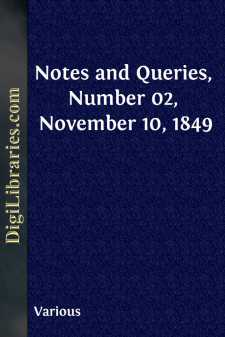Categories
- Antiques & Collectibles 13
- Architecture 36
- Art 48
- Bibles 22
- Biography & Autobiography 813
- Body, Mind & Spirit 142
- Business & Economics 28
- Children's Books 17
- Children's Fiction 14
- Computers 4
- Cooking 94
- Crafts & Hobbies 4
- Drama 346
- Education 46
- Family & Relationships 57
- Fiction 11829
- Games 19
- Gardening 17
- Health & Fitness 34
- History 1377
- House & Home 1
- Humor 147
- Juvenile Fiction 1873
- Juvenile Nonfiction 202
- Language Arts & Disciplines 88
- Law 16
- Literary Collections 686
- Literary Criticism 179
- Mathematics 13
- Medical 41
- Music 40
- Nature 179
- Non-Classifiable 1768
- Performing Arts 7
- Periodicals 1453
- Philosophy 64
- Photography 2
- Poetry 896
- Political Science 203
- Psychology 42
- Reference 154
- Religion 513
- Science 126
- Self-Help 84
- Social Science 81
- Sports & Recreation 34
- Study Aids 3
- Technology & Engineering 59
- Transportation 23
- Travel 463
- True Crime 29
Notes and Queries, Number 02, November 10, 1849
by: Various
Categories:
Description:
Excerpt
A FEW WORDS TO OUR FRIENDS.
In our opening Address we carefully avoided any thing at all approaching to a boast of what we would, or even what we hoped to perform. We stated that "we would rather give a specimen than a description." We are now in like manner unwilling to point as exultingly, as we think we might, to the position which we have already taken. But there is a vast difference between vain boasting and the expression of an honest satisfaction; and it would be worse than an affectation of humility—it would be a mean hypocrisy—if we did not express heartily and unreservedly the gratitude we owe and feel to those who have encouraged us by their friendly advice and able pens. We have opened a Literary Exchange, and we have had the gratification to see that men whose learning and talents the public recognise—leaders in their several branches of inquiry—have at once taken advantage of it. They have proved the necessity for some such medium of communication, as well as their good-will to the one now offered to them, by a gathering in its behalf which the public will respect, and of which we may well feel proud.
Some whose good opinion we most value, and who have spoken most warmly in favour of our plan, have proved the sincerity of their praise by suggestions of improvement in its detail, and hints for its further extension. They may feel assured that such hints and such suggestions shall not be lost sight of. For instance, one respected correspondent hints that as we have very properly adopted Dr. Maitland's suggestion with regard to Herbert's edition of Ame's Typographical Antiquities, namely, that of "offering a receptacle for illustrations, additions, and corrections," and invited "our readers to take advantage of our columns to carry out Dr. Maitland's suggestions," we should open our columns with equal readiness to the correction and illustration of more modern and more popular works. We entirely concur with him; but in reference to this subject there is a distinction which must be borne in mind. Our own literature, like that of every other country, consists of two classes of books. We have the books of pretenders to knowledge, the hasty, crude, imperfect, but often for the time attractive and popular volumes of the Ned Purdons of the day. These books have a use—such as it is—and thus answer their purpose; but it would be for the credit of our literature, and save a world of trouble, if they were forgotten as soon as they had done so. To illustrate such books, to add to their information or correct their blunders, would be useless and almost ridiculous. They should be left to die of mere powerlessness and exhaustion, or to wither under the wholesome influence of a just and manly criticism.
But there are books of another kind—books which our worthy bibliopoles designate as "standard works." These are the books of competent workmen—books which are the result of honest labour and research, and which from the moment of their publication assume a permanent station in our national literature....












